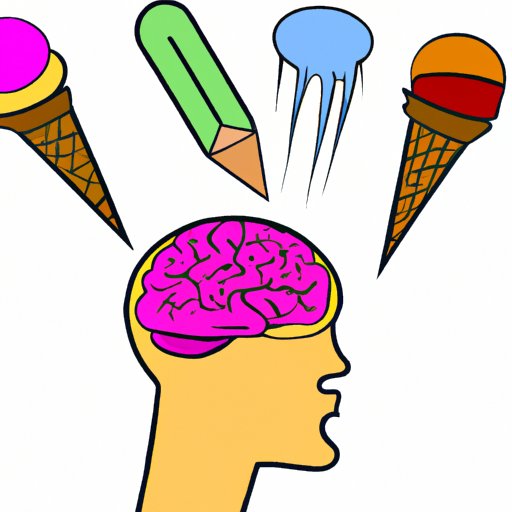
The Brain Freeze: Why We Get It
Have you ever felt an intense headache after consuming cold foods or drinks? That condition is commonly known as brain freeze or ice cream headache. In this article, we will explore the scientific mechanism behind this phenomenon, tips to avoid it, cultural significance, remedies, and common myths and misconceptions. By the end of this article, you will have a better understanding of why we get brain freeze.
The Science Behind Brain Freeze
Brain freeze is a sudden headache caused by the rapid consumption of cold foods or drinks. The pain typically starts a few seconds after ingestion and lasts for a few seconds to one minute. The symptoms of brain freeze may vary from person to person, but common symptoms include a sharp, stabbing headache, usually near the temples, that can be intense and excruciating.
The physiological mechanism that causes brain freeze is due to the rapid cooling and constriction of the blood vessels in the roof of the mouth and the back of the throat. As a result, the blood vessels dilate rapidly after a few seconds, leading to increased blood flow and pressure in the head, which triggers the pain receptors in the trigeminal nerve.
Cold foods and drinks cause brain freeze because of the sudden drop in temperature that occurs in the mouth. When the cold substance enters the mouth, it comes into immediate contact with the warm tissues lining the mouth. The sudden change in temperature triggers the constriction of the blood vessels, which leads to the temporary pain called brain freeze.
In conclusion, brain freeze occurs when cold food or drink causes the rapid constriction and dilation of the blood vessels in the roof of the mouth and back of the throat. This mechanism triggers the pain receptors in the trigeminal nerve, leading to the sharp headache we experience as brain freeze.
Tips to Avoid Brain Freeze
Fortunately, there are practical ways to avoid brain freeze. One of the best methods is to consume cold foods slowly to give your mouth time to adjust to the cold temperature. Another way to avoid brain freeze is to avoid drinking or eating anything too cold, too quickly. Instead of consuming a cold beverage all at once, you can try taking small sips at regular intervals. Additionally, you can try consuming cold foods with a warm drink, which can help prevent the rapid temperature change in your mouth.
Brain Freeze Vs. Migraine
Many people confuse brain freeze with migraines, but the two conditions are entirely different. A migraine is a severe headache that is often accompanied by symptoms such as nausea, vomiting, light and sound sensitivity, and visual disturbances. In contrast, brain freeze is a sharp headache that begins and ends quickly and is triggered by the ingestion of cold foods or beverages.
While brain freeze and migraines have different causes, they can be managed using similar techniques. For instance, applying heat or cold to the affected area can help alleviate symptoms. Additionally, stress reduction, healthy lifestyle choices such as exercise, and staying hydrated can help manage both conditions.
The Cultural Significance of Brain Freeze
Brain freeze has different cultural and traditional significance depending on the region of the world. In some cultures, brain freeze is considered a medical condition that needs immediate attention. In other cultures, they attribute it to spiritual or supernatural causes. In some regions, brain freeze is believed to be a sign of a developing psychic ability or heightened intuition.
While cultural beliefs vary, brain freeze is a scientifically explainable phenomenon that is rooted in the body’s physiological response to cold foods and drinks. Therefore, there is no need to view it as a medical or spiritual condition.
Brain Freeze Remedies
Several remedies can help alleviate the symptoms of brain freeze. These remedies include drinking warm water, placing your tongue on the roof of your mouth, or pressing your thumb against the roof of your mouth. Additionally, over-the-counter pain relievers such as ibuprofen or aspirin can help reduce the pain and discomfort caused by brain freeze.
It is important to note that while these remedies provide temporary relief, medical attention may be required if the pain persists or is severe.
Brain Freeze Myths and Misconceptions
Many myths and misconceptions surround brain freeze. One common misconception is that brain freeze results from the brain’s inability to cope with the sudden temperature change. However, as we discussed earlier, brain freeze is caused by the constriction and dilation of the blood vessels in the mouth and throat, which leads to pressure and pain.
Another common myth is that brain freeze is a sign of a brain injury or tumor. However, there is no research to support this claim. Brain freeze is a temporary condition that resolves quickly, and there is no evidence of any underlying medical conditions that cause it.
Conclusion
Brain freeze is a common but temporary condition caused by the rapid constriction and dilation of the blood vessels in the roof of the mouth and back of the throat. By consuming cold foods and drinks slowly and avoiding quick temperature changes, you can prevent brain freeze from occurring. If brain freeze does occur, many remedies can help alleviate symptoms.




